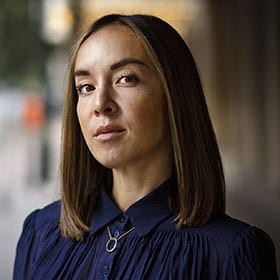Former Co-Executive Director
Youth Rise Texas
FOCUS
Kymberlie Quong-Charles envisions a world where people who have experienced acute trauma, live with anxiety, depression, and other mental health diagnoses can be whole in the workplace, especially those focused on advocacy, organizing and direct service. Her focus is specifically on Black, Indigenous, Women-Identified People of Color who work in justice-oriented settings that center racial and economic equity, civil and human rights to fulfill their mission. Her purpose is to support these institutions to better-align their internal operations and people policies with that of organizational missions as a strategy to retain directly impacted people in these roles, and ultimately creating wider pathways for their leadership.
According to the CDC, 50% of all people living in the United States will be diagnosed with a mental health disorder at some point in their lives. In 2017, the Center for American Progress published findings that Women of Color suffer disproportionately from the type of adverse life experiences that can lead to serious mental illnesses, resulting in “…a major loss of learning and lifetime potential: in short, a loss of future leaders,” and counter the efforts of racial and economic justice movements to forefront the leadership of directly impacted people.
Though there has been a cultural movement away from stigmatization of mental health, persistent biases in policy continue to limit the leadership potential of BIPOC women with mental health diagnoses. In the face of these barriers, leadership can seem out of reach for these women. Kymberlie created the Movement Mental Health Project to collect the oral histories of those who exist at the intersection of race, gender, and mental health while devoting their labor to social justice. Through documenting personal stories, she will advance innovative workplace interventions for those who exist at this intersection and reimagine how we care for one another in workplaces.
STRATEGIC INITIATIVE: Movement Mental Health Project
The Movement Mental Health Project seeks to understand the factors that impact people of color living with mental health challenges who labor in movement institutions. It does so through an oral history project that will establish grounding for future intervention. The long-term aspiration of my work is to meet the moment in which there is investment in placing directly impacted individuals at the forefront of movements so that these leaders are able to be successful, sustain leadership, and shift broader culture around mental health and the workplace. The result will be that ever-increasing numbers of people from historically oppressed communities who live with mental health challenges will be in the lead of transformative change. To seed this endeavor, my strategic initiative will be an oral history project that listens to women of color (WOC) living with mental health challenges who currently or previously labored in movement institutions. Together, we will develop a collective narrative to communicate about what movement professionals who experience mental health challenges have found are supportive and lacking in movement work. Additionally, we aim to put forth proposals that enhance the sustainability of movement leadership for Women of Color (WOC) dealing with mental illness.
MORE ABOUT KYMBERLIE
Kymberlie Quong-Charles grew up with a parent who struggled with persistent and severe mental health challenges. In young adulthood, she also received treatment for similar mental health disorders. During the same period, she found herself on a path to devoting her studies and ultimately her career to various social justice-oriented issues, including healthcare access, perinatal mental health, immigrant rights and alternatives to incarceration. In these spaces, she confronted a repeating pattern of contradiction in the values-driven missions of these organizations, who purport to center justice for people, while the internal policies and operations of these organizations were ill-equipped to support her wellness and leadership, and that of her colleagues, who live with mental health challenges. She began to imagine what it would look like, feel like, and what would be required to create a culture of health in workplaces where all people can thrive and be whole.
Click here to watch Kymberlie’s Legacy Project video.
KYMBERLIE’S WORK AND VISION

